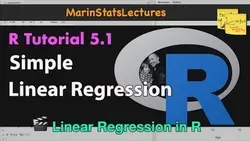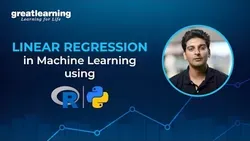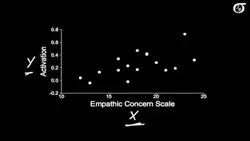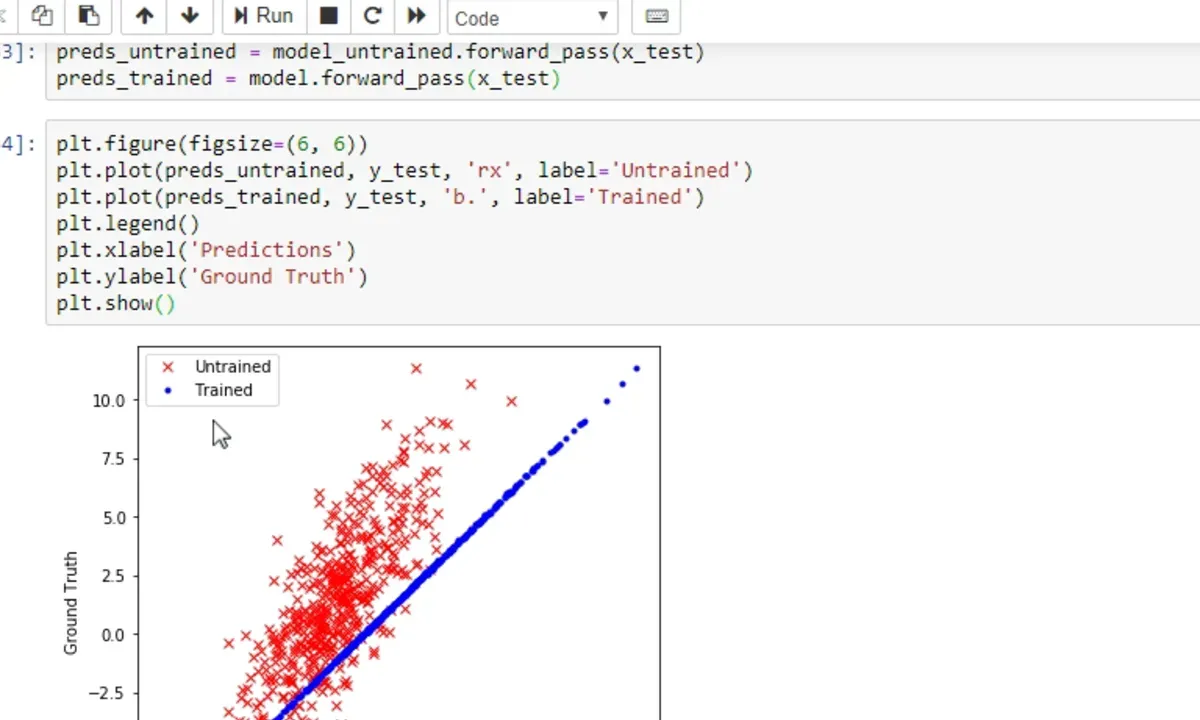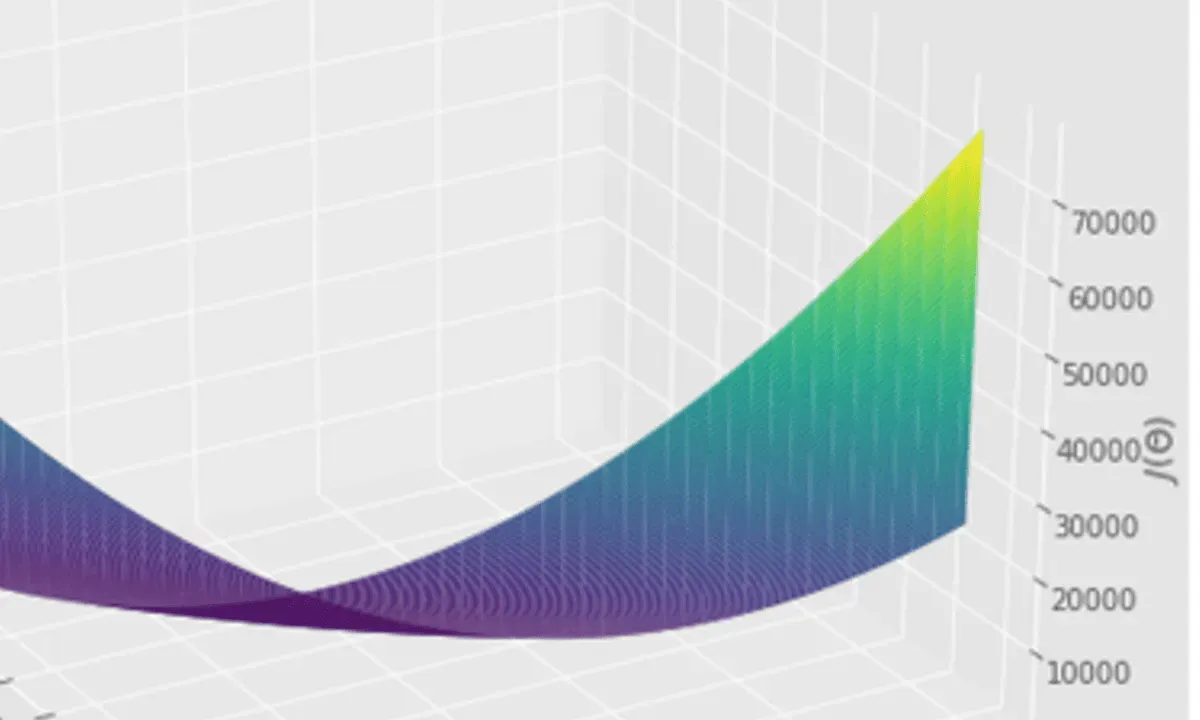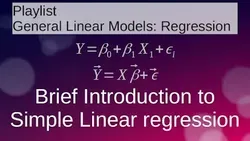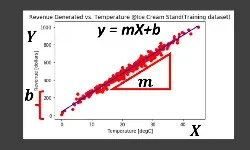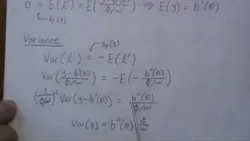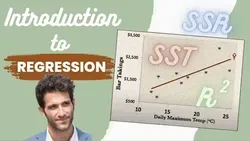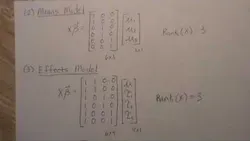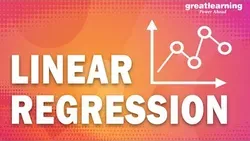Free Online Linear Regression Courses and
Certifications 2026
Linear Regression is a powerful mathematical tool used to analyze relationships between variables. It is a key concept in the field of mathematics and is widely used in data analysis and machine learning. With the help of online courses, learners can gain a comprehensive understanding of linear regression and its applications. By mastering this concept, learners can gain valuable insights into the relationships between variables and make informed decisions.
Popular Courses
In this series of tutorials, MarinStatsLectures covers the basics of linear regression in R. Tutorial 5.1 covers simple linear regression, 5.2 covers checking linear regression assumptions, and 5.3 covers multiple linear regression. The tutorials provide an overview of the linear regression process, from data preparation to model fitting and interpretation.
Learn More
This tutorial by Great Learning provides a comprehensive overview of Linear Regression. It covers the underlying concepts and teaches users how to implement the model in both R and Python. It is an ideal resource for those looking to gain a better understanding of this machine learning technique.
Learn More
Simple Linear Regression is a statistical technique used to predict the value of a dependent variable based on the value of an independent variable. It is based on the Least Squares Regression Line, which is used to interpret the model parameters. Assumptions are made to ensure the accuracy of the model, and these assumptions are checked to ensure the validity of the results. This course provides an introduction to Simple Linear Regression and its various components.
Learn More
This 2-hour long project-based course is perfect for those who want to learn how to implement Linear Regression using Python and Numpy. It is an important concept for those who want to break into Machine Learning and Deep Learning. Even though popular machine learning frameworks have implementations of linear regression available, this course will focus on the practical aspect of implementing linear regression with gradient descent. It is best suited for learners based in the North America region, with plans to expand to other regions.
Learn More
This project-based course on Linear Regression with NumPy and Python is the perfect way to gain a deeper understanding of the fundamentals of machine learning. With Coursera's Rhyme platform, you can do projects in a hands-on manner in your browser with instant access to pre-configured cloud desktops containing all the software and data you need. No need to worry about setting up the environment, just focus on learning and mastering linear regression with Python and NumPy. Join now and start your journey to becoming a machine learning expert!
Learn More
Regression Analysis is a powerful tool used in Business Statistics to forecast and predict outcomes. It is used in a variety of applications to gain insights from data and make informed decisions. Linear Regression is a key component of this process.
Learn More
This course introduces students to linear models, beginning with simple linear regression. It covers the properties of least squares estimators, estimating the residual variance, and matrix notation. It also covers multiple linear regression, diagnostics, and model selection. Finally, it covers generalized linear models and their applications.
Learn More
This guided project is perfect for absolute beginners who want to learn the basics of simple linear regression. It is a hands-on project that will teach you the fundamentals of linear regression and how to apply it to real-world problems. You will learn how to use linear regression to predict the value of one variable based on another variable. By the end of the project, you will have a portfolio of projects that will be essential for your next job interview. So don't miss out and join this project now!
Learn More
Unlock the power of data with "Data Science: Linear Regression." Explore the vital technique of quantifying relationships between variables and mitigating confounding factors. Perfect for aspiring data scientists, this course is a pivotal part of the Professional Certificate Program in Data Science. Learn how to practically implement linear regression using R, uncover insights from real-world case studies, and unravel the intricacies of confounding variables. Propel your data analysis skills and unveil the hidden dynamics within complex datasets.
Learn More
This video series covers the concept of linear regression and its implementation in R. It begins with an overview of simple linear regression, followed by a tutorial on how to use R to perform linear regression. The series then explains how to check linear regression assumptions in R. Finally, it provides an example of linear regression in R. This series is a great resource for anyone looking to learn more about linear regression and its implementation in R.
Learn More
Generalized Linear Models (GLMs) are a type of statistical model used to analyze data. They are based on a canonical link function and use likelihood, score, and Fisher Information to estimate parameters. An iteratively re-weighted least squares method is used for a general link function. GLMs are used to model a wide range of data types, including binary, count, and continuous data.
Learn More
Regression is a statistical technique used to model the relationship between a dependent variable and one or more independent variables. It involves calculating the sum of squared errors (SSE), sum of squared regression (SSR) and sum of squared total (SST) to determine the R-squared value. Degrees of freedom, adjusted R-squared and non-linear relationships are also discussed in the series. Additionally, logarithms and advanced regression techniques are explored.
Learn More
This tutorial by Great Learning provides a comprehensive overview of the Linear Regression Algorithm, Linear Regression Machine Learning, and Linear Regression Full Course. Professor Mukesh Rao, the academic director at Great Learning, will guide learners through the concepts and help them gain a better understanding of the topic. This tutorial is ideal for those looking to gain a deeper understanding of Linear Regression.
Learn More
This course introduces the design of experiments and the use of general linear models. It covers topics such as projection matrices onto c(X), least square estimator of Beta, and estimability. It provides examples and explanations to help students understand the concepts and apply them to their own experiments.
Learn More
This video provides an introduction to Linear Regression Analysis, a powerful Machine Learning algorithm used for predictive analysis. It covers the fundamentals of the algorithm and how to implement it in Python. It is a great resource for those looking to gain a better understanding of Linear Regression and its applications.
Learn More
This course provides learners with an introduction to advanced statistical modeling tools, such as GLMs, nonparametric modeling, and GAMs. It emphasizes a strong conceptual understanding of these tools, as well as ethical considerations when using them.
Learn More
Linear Regression Courses
Career Trends
Career Prospects
| Average Salary | Position Overview
|
| IOS Developer | $157,520 per year
| An iOS developer is in charge of building applications for mobile devices that run on Apple's iOS operating system. A skilled iOS developer should be adept in one of the two primary programming languages for this platform: Objective-C or Swift. |
| Android Developer | $12,937 per year | An Android developer's job is to create software applications for devices that operate on the Android operating system. Due to the fragmentation of this ecosystem, it is crucial for Android developers to ensure their applications are compatible with multiple versions of Android and various device types. |
| Software Engineer | $166,416 per year | Software engineers utilize engineering principles and programming language knowledge to create software solutions for end-users. |
| Data Analyst | $62,953 per year | A data analyst is responsible for reviewing data to identify important insights into a business's customers and to find ways to use the data to solve problems. They also communicate this information to company leaders and other stakeholders. |
| Project Manager | $62,326 per year | A project manager is responsible for organizing, planning, and executing projects while working within constraints such as budgets and schedules. They lead teams, define project goals, communicate with stakeholders, and see the project through to completion. |
Educational Paths
1. Online courses: Platforms like Coursera, Udemy, and edX offer a variety of online courses on Linear Regression. Some of the popular courses are "Linear Regression for Business Statistics" by Udemy, "Applied Data Science with Python" by Coursera, and "Introduction to Linear Regression Analysis" by edX.
2. Books: There are many books available on Linear Regression that provide in-depth knowledge of the subject. Some recommended books are "An Introduction to Linear Regression Analysis" by Douglas C. Montgomery and Elizabeth A. Peck, and "Linear Regression Analysis: Theory and Computing" by Xin Yan and Xinyuan Song.
3.University courses: Linear Regression is a topic covered in many statistics and data science courses at the university level. Enrolling in such courses can provide a comprehensive understanding of the subject.
4. Online tutorials: There are many free online tutorials available on platforms like YouTube and Khan Academy that provide an introduction to Linear Regression and its applications.
Frequently Asked Questions and Answers
Q1: What are the steps to perform simple linear regression analysis?
Simple linear regression is a powerful tool for understanding the relationship between one predictor variable and a response variable. To perform this analysis, you must first identify the predictor and response variables, then calculate the intercept (b0) and slope (b1) of the regression line. This can be done by using the least squares method, which finds the line that minimizes the sum of the squared errors between the observed data points and the regression line. Once the intercept and slope have been calculated, the regression line can be used to predict the response variable given a value for the predictor variable.
Q2: Why is linear regression used in statistical analysis?
Linear regression is a powerful tool for analyzing data and making predictions. It is easy to use, interpret, and provides a variety of statistics to assess the model. While linear regression can model curves, it is limited in the shapes of the curves it can fit. In some cases, it may not be able to accurately capture the specific curve in the data.
Q3: What information can we obtain from the linear regression line?
The linear regression line tells us that there is a linear relationship between the location of garden gnomes in the east-west dimension and the location of garden gnomes in the north-south dimension. This line can be used to predict the location of garden gnomes in either direction, allowing us to better understand the spatial distribution of garden gnomes.
Q4: What is a linear regression in simple terms?
Linear regression is a statistical method that models the relationship between a dependent variable (y) and one or more independent variables (x). The dependent variable is the variable that we are trying to predict, and the independent variables are the variables that we are using to make the prediction.
Q5: What Linear Regression courses can I find on OeClass?
On this page, we have collected free or certified 38 Linear Regression online courses from various platforms. The list currently only displays up to 50 items. If you have other needs, please contact us.
Q6: Can I learn Linear Regression for free?
Yes, If you don’t know Linear Regression, we recommend that you try free online courses, some of which offer certification (please refer to the latest list on the webpage as the standard). Wish you a good online learning experience!
